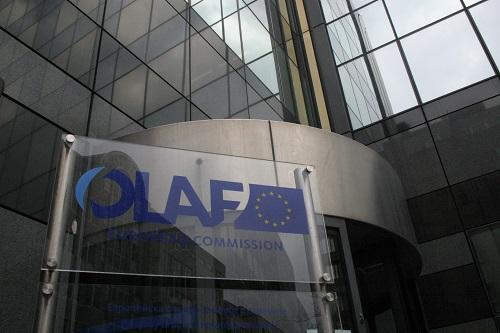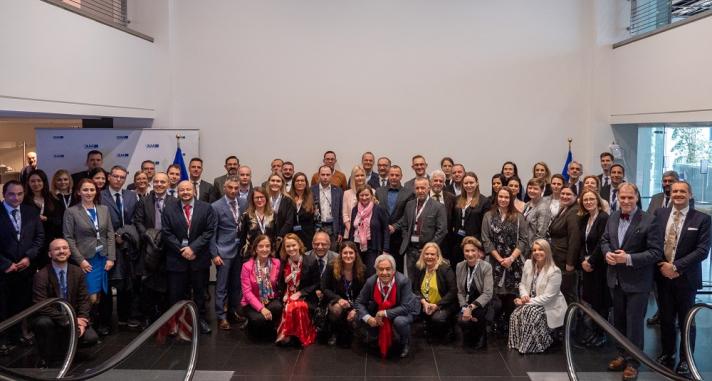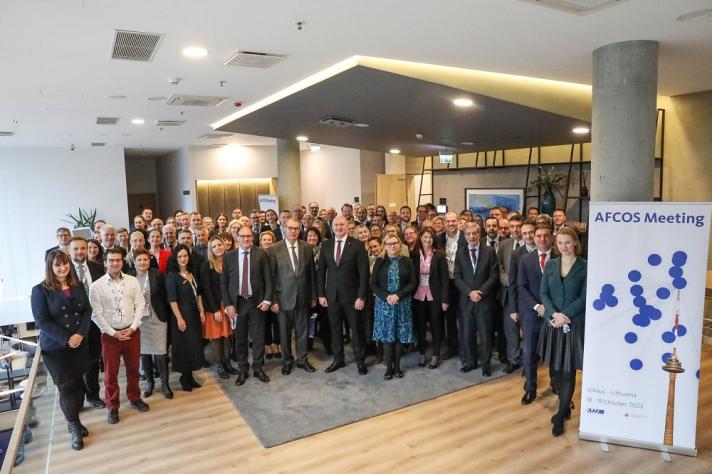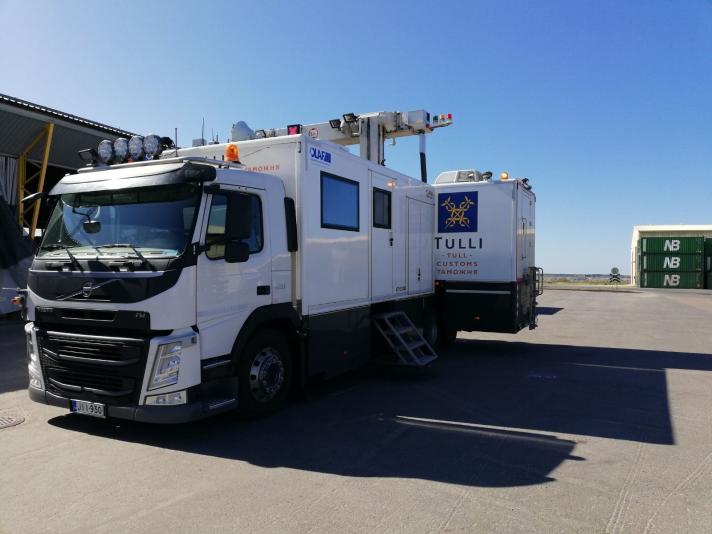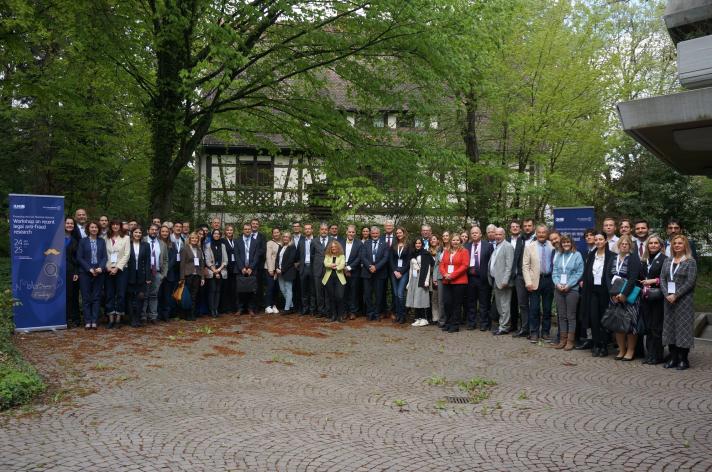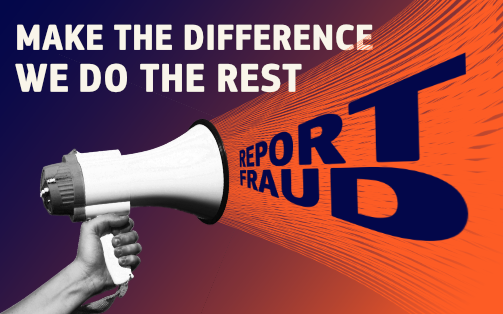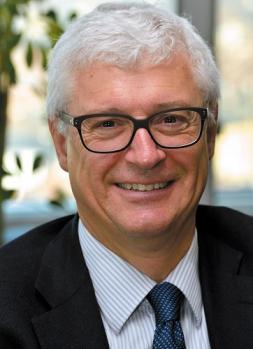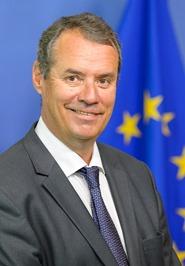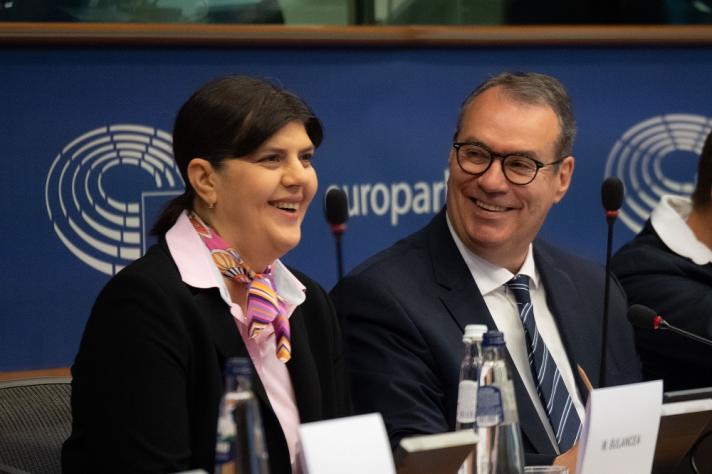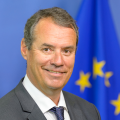
Today is both a moment to glance back with pride at our achievements and a time to look forward into the future. We have shown that investing in the fight against fraud pays off – for every euro that OLAF’s operations cost, we tracked down at least 10 euro to be recovered to the EU’s budget. And this is without counting all the money that we have prevented from being diverted in the first place.
The European Anti-Fraud Office was established with an independent investigative mandate (Decision 1999/352). General rules for OLAF investigations were laid down in Regulation 1073/1999 and an agreement on internal investigations within EU institutions was signed.
OLAF was preceded by UCLAF - the Task Force "Anti-Fraud Coordination Unit" established in 1988 as part of the Secretariat-General of the European Commission. UCLAF worked alongside national anti-fraud departments and provided the coordination and assistance needed to tackle transnational organised fraud.
OLAF is located in Brussels. Since 2020, it also has an office in Luxembourg, to facilitate liaison with Luxembourg-based institutions such as the Court of Justice or the European Public Prosecutor's Office.
Regulation 1073/1999 that laid down the general rules for OLAF investigations also required the establishment of the OLAF Supervisory Committee.
The Committee comprises five independent outside experts appointed by common agreement of the European Parliament, the Council of the EU and the European Commission. Its role is to reinforce and guarantee OLAF’s independence and to monitor the implementation of OLAF's investigative function. The Supervisory Committee is supported in its work by a Secretariat which functions independently and under the instructions of the Committee.
Since 1999, OLAF has hosted on premises a digital forensics excellence centre which acquires and examines case-related data to produce pieces of evidence admissible in the court.
Work is performed by a team of experts within an air-gapped digital environment comprising specialised forensic applications, processing data acquired from an average of 50 worldwide missions per year.
The first report on the operational activities of the Office was published, covering the period from 1 June 1999 to 31 May 2000.
Since then, the annual OLAF reports have given account of the main activities of OLAF, as well as statistical data on investigations, case examples, information on fraud trends, anti-fraud policies and OLAF's cooperation with partner organisations.
Since 2022, OLAF reports have been published in a full digital format, too.
Established in 1999, the Conference of International Investigators (CII) is a forum for investigators of international organizations. The aim is to exchange ideas, share best practices and address challenges in fighting fraud, corruption, and other wrongdoing.
Franz-Hermann Brüner, the first Director-General of OLAF, is regarded as a founding father of the CII. He was instrumental in expanding the CII’s influence in its early years, increasing the number and type of participating organizations and using the CII as a forum to raise the bar on the work of all participating integrity offices.
OLAF is one of the only three permanent members of the CII secretariat, together with the World Bank Integrity Vice Presidency and the Office of the Internal Oversight Services of the United Nations.
The OAFCN is a unique cross-European network of communicators working on anti-fraud issues. The network establishes a close link between the OLAF Spokesperson and Communication Unit and Spokespersons & colleagues responsible for communication and public relations in the national investigative services that OLAF co-operates with in the EU countries (i.e. customs, police, financial police, anti-fraud coordination services, prosecutor’s offices).
The network aims at preventing and deterring fraud through a permanent dialogue, reinforced cooperation, and joint communication initiatives. As far as it is legally and operationally possible, OAFCN members keep each other informed and learn from each other's best practices in communication & media activities on anti-fraud issues.
The network also seeks to raise citizens' and media awareness of the work done by OLAF and its partners in EU countries on protecting the EU budget from fraud. By informing the public, OAFCN communication activities aim to strengthen the fight against fraud and corruption across the EU.
OLAF reinforced its support to Acceding and Candidate Countries in their institutional preparation towards combating fraud against the financial interests of the enlarged Community.
By early 2003, 12 countries had nominated a central Anti-Fraud Co-ordination Structure (today Anti-Fraud Coordination Service, in short: AFCOS) to act as co-ordinator for the implementation of legislative, administrative and operational preparation.
In order to make AFCOS fully operational both at administrative and operational levels, coordination and training meetings were held in Brussels and elsewhere. Particular attention was given to training public prosecutors who would take on responsibility for anti-fraud work and to technical training in the use of the Anti-Fraud Information System (AFIS).
Currently, all EU countries have established an AFCOS, as prescribed by Article 12a of Regulation 883/2013. OLAF and the AFCOS meet on a regular basis, with the aim to make sure that OLAF and national authorities cooperate and share information efficiently. This includes the exchange of experience and best practices in investigative cooperation.
Meeting of the national Anti-Fraud Coordination Services (AFCOS) from all EU Member States on 18-19 October 2023 in Vilnius, Lithuania
The European Community set up the Hercule programme to promote activities related to the protection of its financial interests.
Hercule I started in 2004 (Decision 804/2004/EC) and was extended under the Financial Perspectives for 2007-2013 (Decision 878/2007/EC), giving rise to Hercule II (2007-2013), followed by Hercule III (2014-2020) (Regulation (EU) No 250/2014). Since 2021, Hercule has been part of the Union Anti-Fraud Programme (UAFP).
The financial support provided by the Hercule programme mostly consists of grants, awarded to competent authorities in EU countries. The grants aim to strengthen the operational and technical capacity of EU countries to investigate activities detrimental to the EU budget.
OLAF's aim is to ensure that EU funds, whether spent in an EU country or abroad (in the form of e.g. development assistance) reach their intended beneficiaries, without being diverted by fraud and corruption.
In particular, international cooperation is important because large amounts of EU funds are disbursed in non-EU countries and territories or channelled through other donors or international organisations.
OLAF cooperates with investigative, administrative and judicial partner services in EU and non-EU countries and territories, as well as international organisations. These partners have the competence to exercise control over projects financed by the EU, and also to investigate and/or prosecute cases of fraud, corruption and other illegal activities affecting those funds.
In order to facilitate practical day-to-day cooperation, OLAF has signed Administrative Cooperation Arrangements with some partner services. The first such arrangement was signed on 15 March 2007, with the Argentinian Fiscalía de Investigaciones Administrativas. Further arrangements have been signed since then, with partners in over 25 non-EU countries.
Read more about OLAF's cooperation with investigative partners
The Anti-Fraud Information System (AFIS) / Irregularity Management System (IMS) is a trans-European platform boosting coordination between EU countries, international organisations and Commission services on customs matters and irregularities. The AFIS platform incorporates several modules.
With 1.400 connected authorities/organisations and more than 5.000 users, AFIS/IMS processes more than 2.5 billion messages, provides information on 165 million computed container trips and handles more than 100 active Mutual Assistance cases.
Today, the AFIS database contains over 33,000 cases.
OLAF launched a new, web-based tool, the Fraud Notification System (FNS), allowing citizens to pass on information concerning potential corruption and fraud online.
The FNS is still in use today, allowing citizens to report fraud online, in any of the official EU languages, anonymously.
Giovanni Kessler is an Italian prosecutor. He served as Public Prosecutor in the criminal courts of Trento, Bolzano and at the Anti-Mafia Department in Sicily from 1986 until 1998. He dealt with organised crime, corruption and financial crimes.
From 1998 to 1999, he was Deputy Head of the OSCE Kosovo Verification Mission in Pristina, in charge of Police and Justice matters (Organisation for Security and Cooperation in Europe).
As a judicial expert he participated in several European Commission and Council of Europe evaluation missions in Eastern Europe.
In 2001, he was elected to the Italian Parliament as independent member. He sat on the Justice Affairs Committee and during his five-year term, he authored numerous bills on the International Criminal Court, the European Convention against corruption, the International Judiciary Cooperation and the European Arrest Warrant. From 2003-2006, he also became Vice-President of the Parliamentary Assembly of the Organisation for Security and Cooperation in Europe (OSCE). He participated in and led International Election Monitoring missions in the United States and in many other OSCE countries.
From 2006 to 2008, he held the position of Italian High Commissioner to Combat Counterfeiting.
In December 2008 he was elected member, and subsequently President, of the Legislative Assembly of the Autonomous Province of Trento. He resigned from this position before taking up the post of Director-General of OLAF.
OLAF is the lead service for the Commission Anti-Fraud Strategy and, more generally, for the conception and development of an EU anti-fraud policy.
The Commission Anti-Fraud Strategy, adopted in June 2011, aimed at improving:
- the prevention and detection of fraud;
- conditions for fraud investigations;
- recovery and deterrence.
The strategy was directed primarily at Commission services and provided for the development of sectoral strategies in each policy area. The strategy highlighted the following priorities:
- adequate anti-fraud provisions in Commission proposals on spending programmes under the new multiannual financial framework (MFF);
- the development and implementation of anti-fraud strategies at Commission service level, with the assistance of OLAF;
- the revision of the public procurement rules in order to simplify requirements and reduce the risks of procurement fraud in the Member States.
Learn more about the European Commission Anti-Fraud Strategy
On 1 October 2013, Regulation No 883/2013 (the so-called "OLAF Regulation") on investigations by OLAF entered into force.
It brought significant changes to the work of OLAF and to its relations with various stakeholders. The regulation further defined the rights of persons concerned, introduced an annual exchange of views between OLAF and the EU institutions and required that each Member State designate an Anti-Fraud Coordination Service.
The Guidelines on Investigation Procedures(GIP) was issued. It is a set of internal rules that staff has to apply in order to ensure that OLAF investigations are carried out in a consistent and coherent way.
OLAF has an explicit mandate to fight cigarette smuggling. We do not only fight illicit tobacco trade from an operational point of view, through our investigative work, but we also contribute to the development of EU policies in this area.
A major EU action in this regard was the comprehensive EU strategy for fighting illicit trade in cigarettes, adopted in 2013. It proposed measures to reinforce:
- the cooperation with the main source and transhipment countries;
- the control of the supply chain of tobacco products such as tracking (monitoring the movement) and tracing (to detect at which point the product fell off the legal supply chain).
Other priorities included:
- enhanced information and intelligence gathering and sharing among the competent authorities inside the EU, including the agencies and bodies at EU level;
- organising targeted customs operations;
- increasing enforcement capacity with more coordinated financing, technical assistance and training, as well as sharing of best practices;
- addressing corruption;
- decreasing the incentives created by the gaps and loopholes in the excise legislation;
- strengthening the disincentives (sanctions) and
- raising awareness in the public about the risks associated with consuming illicit cigarettes.
The strategy was accompanied by an action plan, implemented in close cooperation with national administrations.
OLAF's aim is to ensure that EU funds, whether spent in an EU country or abroad (in the form of e.g. development assistance) reach their intended beneficiaries, without being diverted by fraud and corruption.
In particular, international cooperation is important because large amounts of EU funds are disbursed in non-EU countries and territories or channelled through other donors or international organisations.
OLAF cooperates with investigative, administrative and judicial partner services in EU and non-EU countries and territories, as well as international organisations. These partners have the competence to exercise control over projects financed by the EU, and also to investigate and/or prosecute cases of fraud, corruption and other illegal activities affecting those funds.
In order to facilitate practical day-to-day cooperation, OLAF has signed Administrative Cooperation Arrangements with some international organisations. The first such arrangement was signed on 7 June 2013, with the African Union Commission / Office of Internal Audit.Further arrangements have been signed since then, with over 15 partner services of international organisations.
Read more about OLAF's cooperation with investigative partners
Following the organisational restructuring by the Juncker-Commission, Directorate-General for Economic and Financial Affairs (DG ECFIN) took over from OLAF the responsibility for the area of the protection of the Euro.
The OLAF Case Management System (OCM) ensures that OLAF staff can collect, process and report on case-related information with a high degree of automation.
Since 2016, 13 395 cases have been managed, with almost 700 000 registered documents and more than 3 million attachments).
In recent years, a major achievement of the OCM was that it kept OLAF operational during the pandemic by allowing staff to manage their investigative work remotely in a secured environment as if they were in the office.
In July, the EU adopted the Directive on the fight against fraud to the Union's financial interests by means of criminal law ("PIF directive"). Its aim is to create a stronger and more harmonised system, with minimum common rules, to fight crime affecting the EU budget. Applying criminal law, the EU’s financial interests and taxpayers’ money can be better protected across the EU.
In November, OLAF welcomed the adoption of Regulation (EU) 2017/1939 to set up a European Public Prosecutor’s Office (EPPO), an independent and decentralised prosecution office of the European Union with the competence to investigate, prosecute and bring to judgment crimes against the EU budget. It establishes a system of shared competences between the EPPO and national authorities in tackling such cases.
Mr Itälä has a background in law and law enforcement, holding a Master in Law from Turku University, and a Master in Law with court training from Vehmaa District Court.
He was acting Police Commissioner and acting Town Prosecutor of Naantali, Finland from 1985 to 1988, before practising law in a firm until 1995, when he was elected Member of the Finnish Parliament. Over the 9 years of his Parliamentary career he served as Chair of the National Coalition Party and as well as Vice-Chair of the International Democrat Union, was appointed Minister of the Interior and Deputy Prime Minister of Finland.
In 2004, he was elected into the European Parliament, where he was an active member of the Committees on Budgets and on Transport and Tourism, respectively, as well as Deputy Coordinator of the Committee on Budgetary Control. Between 2004 and 2006, Mr Itälä was also Vice-Chair of the European People’s Party and European Democrats’ Group in the European Parliament.
Prior to his appointment as Director-General of OLAF in August 2018, Mr Itälä was a Member of the European Court of Auditors (2012-2018).
The Commission presented a new action plan, with concrete steps to address both the supply and demand for illegal tobacco products.
The plan continues to focus on:
- internationally – the Protocol to the WHO Convention on Tobacco Control (‘FCTC Protocol’)
- in the EU – implementing the new traceability system for tobacco products
The FCTC Protocol is a key tool to fight the illicit tobacco trade at the global level. The first Meeting of the Parties to the FCTC Protocol to Eliminate Illicit Trade in Tobacco Products was held in Geneva in October 2018. This was a historic event marking the entry into force of the Protocol as a dedicated global anti-smuggling treaty. The event is the culmination of years of EU engagement, with OLAF as lead service, beginning with the inception of the Protocol through its negotiation phase and ending with its entry into force on 25 September 2018.
Every year, under Article 325(5) of the Treaty on the Functioning of the European Union, the European Commission, in cooperation with the EU Member States, submits to the European Parliament and to the Council a report on the measures taken to protect the EU’s financial interests from fraud and other illegal activities.
This report, also known as the PIF report, presents a summary of such measures taken at EU and Member State level and an analysis of the main achievements in detecting irregularities and fraud related to EU expenditure and revenue. It is accompanied by several supporting documents.
The information included in the PIF report represents the basis for the European Parliament, which adopts a resolution on the protection of the EU’s financial interests each year.
The first report was published in January 1990. 2018 marked the 30th edition of the PIF report.
OLAF is the lead service for the Commission Anti-Fraud Strategy and, more generally, for the conception and development of an EU anti-fraud policy.
In April, the Commission adopted its new Anti-Fraud Strategy that seeks to further improve the detection, sanctioning and prevention of fraud. The new Strategy pushes for more consistency and better coordination in the fight against fraud among the various Commission departments. It also seeks to reinforce the Commission's corporate oversight of fraud issues, by giving the European Anti-Fraud Office (OLAF) a much stronger advisory and supervisory role.
Learn more about the European Commission Anti-Fraud Strategy
In December, the revised Regulation 883/2013 was adopted. It set out how OLAF is to work in complementarity with the prosecutors in the EPPO to ensure that EU funding is well protected.
The European Public Prosecutor’s Office (EPPO) started its operations on 1 June. The EPPO is the new independent public prosecution office of the EU.
OLAF and the EPPO are both entrusted with the mandate to protect the Union's financial interests. They have distinct but complementary mandates. While the EPPO conducts criminal investigations and prosecutions, OLAF carries out administrative investigations with a particular emphasis on facilitating administrative recovery, preventing further harm to the EU’s finances through recommendations for administrative measures and by recommending disciplinary measures where appropriate.
OLAF mutually cooperates with the EPPO by providing information, analyses, expertise and operational support.
Regulation (EU) 2021/785 established the Union Anti-Fraud Programme. This runs for the duration of the 2021-2027 multiannual financial framework.
The programme’s general objectives are to:
- protect the EU’s financial interests;
- support overall assistance and cooperation between national administrative authorities and the European Commission in applying customs and agricultural legislation.
These are implemented through three specific objectives:
- prevent and combat fraud, corruption and any other illegal activities against the EU’s financial interests, through financial support (previously offered by the Hercule III programme), in particular technical support, operational support for investigations, specialised training and research activities; (€114.207 million of the programme’s budget);
- support, via the Anti-Fraud Information System platform (AFIS), information exchange and operational activities of mutual administrative assistance on customs and agricultural issues (€60 million of the budget);
- strengthen reporting of irregularities, including fraud, of the EU’s shared management and pre-accession assistance funds (€7 million of the budget).
Regulation 2020/2223 called for the creation of the function of the Controller of procedural guarantees.
The Controller examines in an independent manner complaints submitted by persons concerned in investigations carried out by OLAF. Through the complaint’s mechanism, the Controller monitors OLAF’s compliance with procedural guarantees and with the rules applicable to investigations, in particular infringements of procedural requirements and fundamental rights.
Dr. Julia Laffranque was appointed Controller of procedural guarantees by the Commission Decision on 3 May 2022 for a five-year non-renewable term.
The 2019 Commission Anti-Fraud Strategy (CAFS) specified that the accompanying action plan would be reviewed and amended as appropriate.
In 2023, new realities facing the Commission in its efforts to protect the EU budget called for such a revision. The EU was confronted with great challenges, including inflation, post-pandemic recovery, climate change and the war of aggression on Ukraine. Such challenges put an enormous strain on the EU budget, making it more important than ever that the budget is well protected and that EU funds reach their intended recipients.
Against this background, it was an appropriate time to take stock of the Commission’s efforts to fight fraud and irregularities, and to provide fresh impetus to such efforts. The aim was to have a targeted and impactful action plan addressing the increased challenges facing the EU in the area of anti-fraud while building on the work done under the 2019 action plan.
Preparatory works have started for the evaluation report on the application and impact of Regulation 883/2013, in particular as regards the effectiveness and efficiency of the cooperation between OLAF and the European Public Prosecutor's Office (EPPO). The evaluation is set to be completed by mid-2025.

